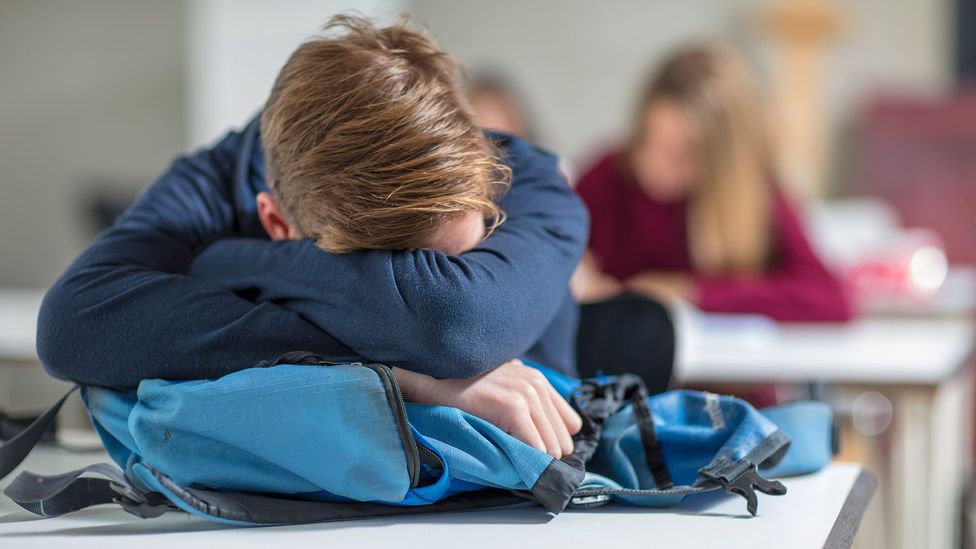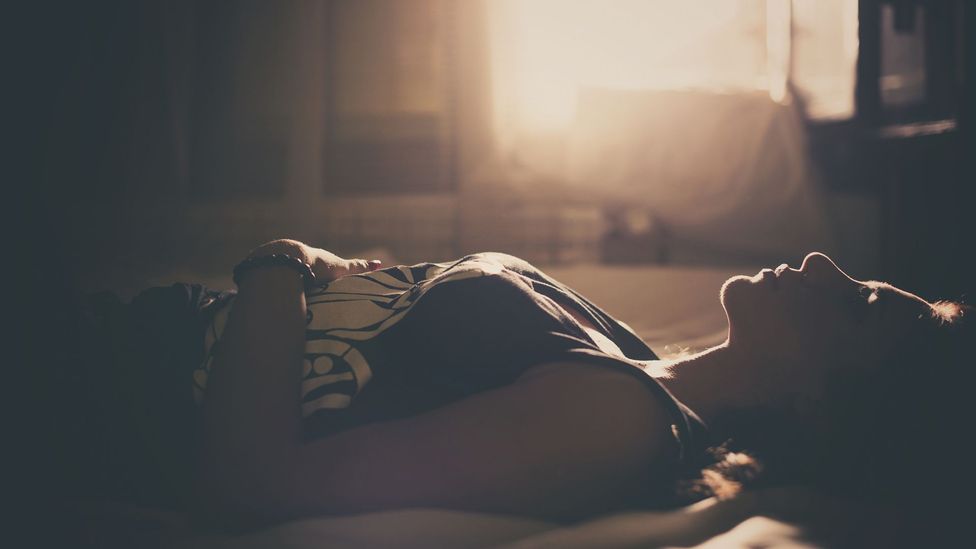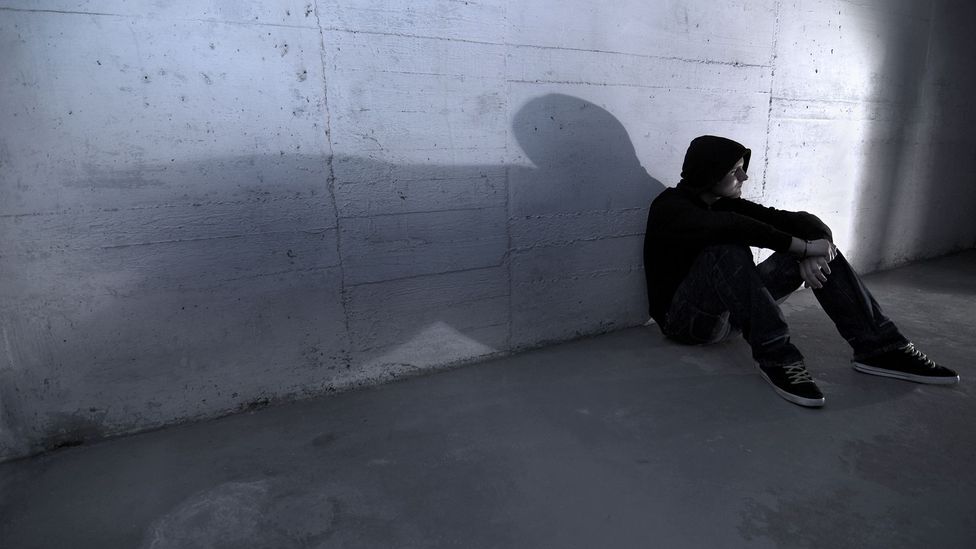How Did People Used to Teach Babies to Sleep
Why teenage slumber is and so of import for mental health
(Image credit:
Westend61/Zerocreatives/Getty Images
)

Teenagers can sometimes struggle to go out of bed in the morning time – only ensuring they go enough sleep could be vital for health in subsequently life.
I
It'southward late morning and the teenagers in the house are still fast asleep long later y'all've got upwardly. Should you blitz upstairs and pull them out of bed by their feet? Information technology may exist tempting, but the answer is probably no. The evidence is mounting that slumber in boyhood is important for current and futurity mental health.
It should come as no surprise that a serious lack of sleep, or seriously disturbed sleep, is one of the virtually common symptoms of depression among adolescents. Afterward all, all the same tired yous might feel, it's hard to drop off if y'all're wracked with doubts or worries. This is true for adults also, with 92% of people with depression complaining of sleep difficulties.
What is perhaps less intuitive is that, for some, problems with sleeping might start earlier the depression, raising the hazard of mental health problems in the hereafter. Does this mean that slumber in teenagers should exist taken more seriously? And tin can it lower the risk of depression later on?
You might also exist interested in:
- The sleep illness that can exist fatal
- Why scientific discipline says you need a nap
- Why students need to get more than sleep
In a study published in 2020, Faith Orchard, a psychologist at the University of Sussex, examined the information from a large grouping of teenagers followed from the age of 15 to 24. Those who reported sleeping desperately at the age of 15, just didn't accept depression or anxiety at the time, were more than probable than their peers to be experiencing anxiety or depression when they reached 17, 21 or 24 years of historic period.
With adults also, slumber issues can be a predictor of future depression. A meta-assay of 34 studies, which between them followed 150,000 people over a menstruum of betwixt three months and 34 years, constitute that if people had slumber problems, their relative risk of suffering depression after in life doubled. Of class, it doesn't follow that everyone with insomnia is going to develop depression later on on. Most people won't. The final thing that people with insomnia need of course, is the worry nigh what might happen to them in the futurity.

Persistent sleep problems in teenagers should exist diagnosed in case they atomic number 82 to other problems in later life (Credit: Tara Moore/Getty Images)
Only you can run into why in some cases poor sleep might contribute to poor mental health. A deficit of sleep has well-established negative furnishings on united states, including a tendency to withdraw from friends and family, a lack of motivation and increased irritability, all of which can touch the quality of a person's relationships, putting them at greater risk of depression. On top of that at that place are biological factors to consider. A lack of sleep can pb to increased inflammation in the body, which has been implicated in mental health difficulties.
Researchers are now examining the human relationship between slumber disorders and other mental wellness weather. The eminent Oxford University neuroscientist Russell Foster has institute that this link doesn't but occur in depression. Disruption to circadian rhythms – the natural sleep-wake wheel – is non uncommon among people with bipolar disorder or schizophrenia. In some cases, the trunk clock can get then out of sync that people find themselves awake all night and asleep during the day.
His colleague, the clinical psychologist Daniel Freeman, has called for sleep problems to be given a higher priority inside mental health care. Considering they are common across dissimilar diagnoses, they don't tend to be viewed as primal to a detail status. He feels they are sometimes neglected, when they could be tackled.
Even when mental health issues precede disrupted sleep, the lack of sleep might exacerbate a person's difficulties. Subsequently all, just one night of slumber deprivation has a well-established negative impact on mood and thinking.
The complex relationship between sleep and mental health is farther reinforced past the finding that if yous treat low, the problems with sleep don't all disappear. It's easy to see how psychological treatments which help people reduce ruminating over negative thoughts could besides result in them falling asleep more easily. Simply in 2020 Shirley Reynolds, a clinical psychologist at Reading University, and her squad trialled three different psychological treatments for depression. They worked equally well in reducing depression, but only sorted out the slumber bug for half of the participants. For the other half, the insomnia persisted, suggesting it was independent of their depression and needed to exist addressed separately.

A deficit of sleep has well-established negative effects, including a tendency to withdraw from friends and family (Credit: Milos Kreckovic/Getty Images)
That said, bug sleeping and mental health difficulties tin can stem from the same causes. Traumatic or negative events, for instance. Or excessive rumination or various genetic factors. Genes involved in serotonin pathways and dopamine functioning take been shown to be factors in both poor sleep and low, as have the genes which influence a person's cyclic clock.
And, as we've already seen, it's likely that insomnia and mental health issues exacerbate each other, making both issues worse. You're distressed so you can't sleep; you can't sleep so you are more distressed – and and so on, and so on, in an escalating cycle.
It's too possible that a lack of sleep is not and so much a cause of later low, only more of an early warning indicate. The worrying that stops you lot dropping off can in some cases exist a starting time symptom of more than serious mental health issues to come up.
Foster is convinced that from a biological perspective, the best way to disentangle the web of correlation and causation is by studying the impact that disruption of circadian rhythms could exist having on the brain. He says we need to wait at the complex interactions between multiple genes, brain regions and neurotransmitters to understand what'due south happening.
So perhaps persistent issues with sleep need to be taken more seriously in teenagers and adults. Sleep interventions are straightforward, and in some cases successful. What is already clear, from a meta-analysis of 49 studies, is that tackling poor sleep among those with insomnia, who are already experiencing symptoms of depression, not only helps them sleep amend but also reduces the depression.

Indisposition and mental wellness issues can exacerbate each other (Credit: Aurumarcus/Getty Images)
The large Oasis trial led past Daniel Freeman across 26 universities in the United kingdom of great britain and northern ireland establish that digital cognitive behavioural therapy for students with insomnia, not only helped them to sleep, but reduced the occurrence of hallucinations and paranoia, symptoms of psychosis.
The one thousand thousand-dollar question is whether sleep interventions could fifty-fifty prevent mental health problems down the line. To respond this, large-scale, long-term trials would be needed. One advantage of before and ameliorate interventions to prevent poor slumber – both for itself and to potentially reduce wider mental wellness problems – is that there is less stigma surrounding indisposition, so it might prove easier to persuade people to come forward for treatment.
In the meantime, anyone who has problem sleeping can try the techniques shown to be most effective: ensuring you get enough calorie-free during the twenty-four hours (in the forenoon for nearly people); not napping for longer than 20 minutes; not eating or exercising or drinking caffeine late in the evening; avoid reading your emails or discussing stressful topics in bed; keeping the bedroom cool, placidity and night; and trying to get up and go to bed at the same time each day.
Getting better slumber won't on its own solve the mental wellness crunch, of course. Simply could information technology make a difference in the long run? Even if it doesn't, every bit sleepy teenagers know, even for its own sake, in that location'due south null amend a good night's sleep.
--
Join one meg Future fans past liking united states on Facebook , or follow us on Twitter or Instagram .
If you liked this story, sign upwards for the weekly bbc.com features newsletter , called "The Essential List". A handpicked selection of stories from BBC Future, Culture, Worklife, and Travel, delivered to your inbox every Friday.
How Did People Used to Teach Babies to Sleep
Source: https://www.bbc.com/future/article/20210305-why-teenage-sleep-is-so-important-for-mental-health
0 Response to "How Did People Used to Teach Babies to Sleep"
Post a Comment